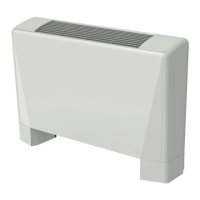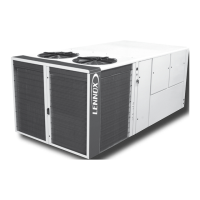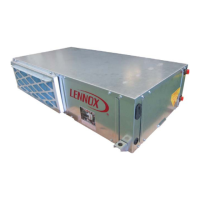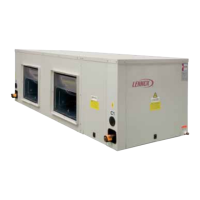• 6 •
11
12
13
3 cm/m
15
14
3 cm/m
5 mm
Installation, Operation and Maintenance Manual / ALLEGRA II-IOM-1901-E
Il mobile di copertura è rivestito da un fi lm protettivo: toglier-
lo prima di fi ssare il mobile alla macchina. Rimontare il mobile
di copertura (se previsto), altrimenti l’apparecchio deve essere
mascherato a cura del cliente.
ATTENZIONE! Proteggere l’apparecchio con un cartone nel
caso in cui le opere murarie dell’edifi cio debbano ancora te-
minare (Pic. 11).
Ricordarsi di togliere il cartone di protezione prima di avviare
gli apparecchi.
WATER CONNECTIONS
CONNECTION TO THE WATER MAINS
CAUTION! Always use a wrench and nose key for connection of the coil to the pipes (Pic. 12). If the solenoid
valve is installed, suitably insulate the valve body with insulating material (Pic. 13).
Connect the water inlet and outlet pipes, observing the indications given on the side of the appliance.
Correctly insulate the water supply pipes to prevent dripping during the cooling mode of operation. An shutoff
valve should be inserted on the water supply pipe and balancing valve on the outlet pipe. The valve body
and balancing valve should also be properly insulated to prevent dripping. It is the installer’s responsibility to
insulate properly and the manufacturer cannot be held liable for any insulation work.
NOTE: it is always advisable to install the solenoid valve. In the heating mode of operation the solenoid
valve reduces consumption because upon reaching the set temperature the circulation of water is stopped
to avoid wasting energy (the fan coil would otherwise continue to heat like a radiator, even with the motor at
a standstill). In the cooling mode of operation the solenoid valve stops the circulation of water when the set
temperature is reached, this stopiing the internal exchanger
from continuing to condense water with possible undersirable dripping into the fl oor. It also reduces chiller
operation with consequent energy saving.
CONDENSATE WATER DRAINAGE
The condensate drain pipe should slope downwards by at least 3 cm/m and should not have ascending
or throttled section in order to ensure a regular fl ow of water. It is advisable for a trap to be fi tted. The
condensate drain pipe should be connected to a rainwater drainage system. Do not use sewage system to
avoid possible odours in the event of evaporation of the water in the trap. Upon completion of work, check that
the condensate fl ows out properly by pouring water into the tray (see Pic. 14 and 15). The condensate water
drainage system should be fabricated
in a workmanlike manner and should be periodically checked. The manufacturer cannot be held liable for any
damage caused by dripping in the absence of a solenoid valve or of periodic maintenance of the drainage
system.

